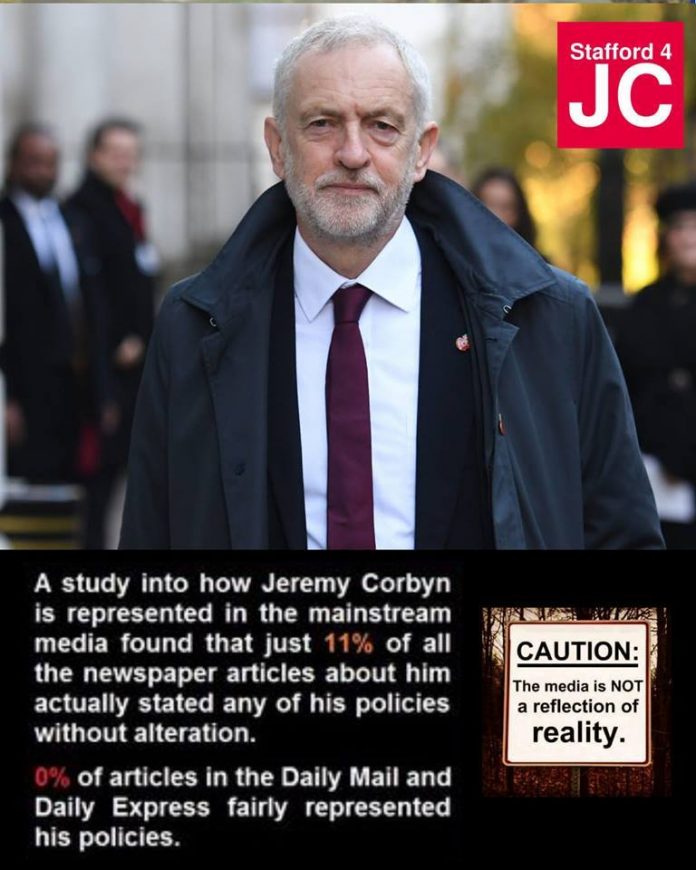The news cycle moves so quickly nowadays. While the row about Labour and anti-semitism continues to rumble on in the background, it may be time to consider the broader context of that furor.
In the 1990s, Blair’s Labour opposition developed a media strategy under the influence of Alastair Campbell that was based around a “news grid” – a successful calendar-based approach to dominating the news agenda, with co-operative media contacts and accompanying “rebuttal unit.”
It might seem quite pedestrian nowadays, but it was widely hailed at the time and considered a key factor in the scale of the party’s eventual 1997 victory. This approach has been adopted ever since by any party with resources to properly implement it, though it also started to feed the widespread cynicism against “spin.”
Since Corbyn’s name got on the ballot for Labour leader in 2015, the general approach of much of the billionaires and establishment media has been incessantly labeled him “a disaster.” This analysis has been crowbarred into many stories.
The Skripol poisoning is a good recent example. Despite the many aspects of mystery, controversy and diplomatic fallout, one of the main focuses in the early day was to say how it was a disaster for Corbyn when he urged some caution about the UK’s response (he also crossed a line by pointing out the number of donations The Tory Party receives from Russian oligarchs). By contrast, Theresa May was portrayed as tough and affirmative to counter the hangover from her famously “weak and wobbly” 2017.
The Skripol case was unpredictable, but it was preceded by Czech spy allegations which, despite falling apart quickly to those paying attention, seem to have had more preparation, all while the anti-semitism coverage ebbed and flowed as it has for many months.
There is an air of coordination to all this. It fits a “grid” strategy and is likely to tie into May local elections, which risk going badly for The Conservatives, depending partly on the ongoing propaganda war. Stories are generally given a week to run – perhaps longer if the mud sticks.
This strategy has key players along with fellow travelers who will jump on board with whatever the latest incarnation of the “Corbyn is a disaster” narrative happens to be. This provides the benefit of some high-up journalists not having to think too hard for themselves.
As we noted last week, one of those key players is Paul Staines aka Guido Fawkes.
One irony to emerge in recent days is that after putting so much effort into portraying Corbyn and Labour as a haven of anti-semitism, it turns out that Staines himself tried to court some of the biggest anti-semites going back in his student days.
As reported by Pride’s Purge, Staines was once Chair of a University Conservative Federation where he waxed lyrical about the prospects of cooperating with the fascist BNP.
There’s nothing new in conservative/fascist cooperation. It’s often noted that Hitler came to power via democracy in 1933. It’s less well known that he did so in a coalition with conservatives in a pattern of formal and informal alliances that have reared their heads across the world ever since (consider the support for Trump from the likes of the KKK, Richard Spencer et al.)
You might think that this would have caused quite a stir in the establishment media, given how many of them seem to hang on Fawkes’ every word and you might think they’d want to give him a slightly wider berth since this murky past emerged. But to think these things, you’d also need to consider the same media to be consistent and unhypocritical.
Now, with the chemical attack in Syria sparking talk of military escalation, there’s yet another chance to have a go at the Labour leader, who once again urges caution in our approach.
The same media that consistently sweeps the UK facilitated massacres in Yemen under the carpet finds massacre victims elsewhere to be more politically useful. And to help out with the project, Nick Griffin has been dredged up from his political grave. He too is skeptical about increased intervention and has supported Corbyn’s line. The New Statesman and others have used this to imply that Corbyn’s name is now tainted with fascist approval. Anyone who doesn’t want a massive escalation of an already hugely complex and tragic conflict is probably a bit of a Nazi if you think about it. The liberal press can often be got on side for a war, as was shown when Trump attacked Syria last year – the likes of CNN suddenly declared he had become “presidential” after months of berating him.
Quite how the Syria situation plays our remains to be seen. Trump is in a bad way domestically; his attorney has just been raided by the FBI and the Mueller probe getting ever closer to home.
Many of his pacifiers and more “adult” team members have departed the scene, while John Bolton, the arch neo-conservative warmonger, and Islamophobe, has just started in his key role as Secretary of state. Military action may serve as a distraction that works in Trump’s favour. Coverage of Theresa May’s responses is conflicted, but if a chance is taken to make Corbyn look like a Kremlin stooge or Assad Appeaser it will probably be grasped with both hands.
And with all this going on, important national and international stories can go on the back burner – the NHS crisis, Brexit quagmire, the London crimewave, Israel/Palestine and more.
Whatever happens at home or abroad in coming days, it’s very likely that events can once more be presented as “a disaster for Corbyn”, as has probably been the plan for some time, especially given that council election are only a few weeks away.
Stephen Durrant







